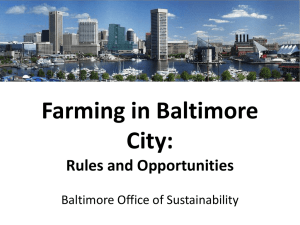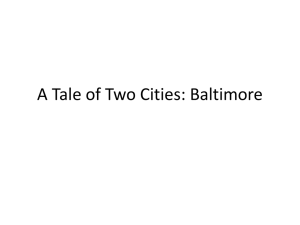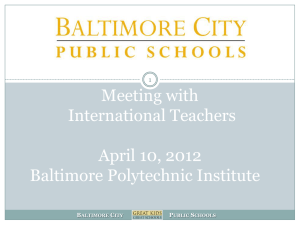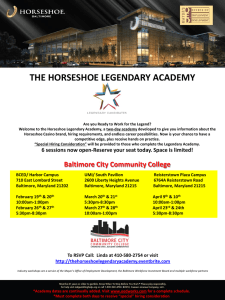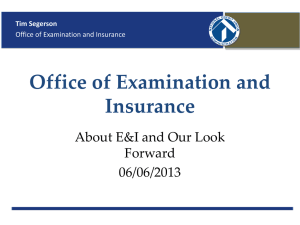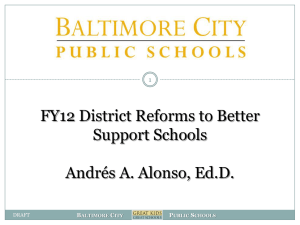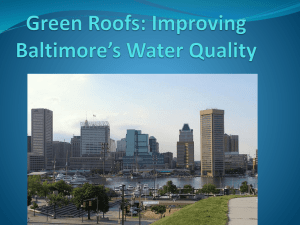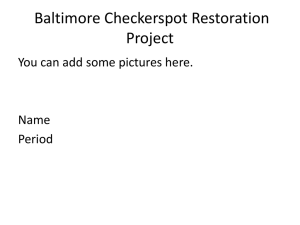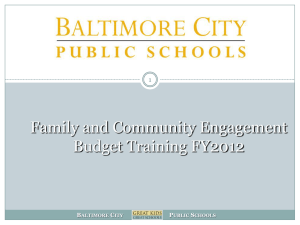Homegrown Baltimore: Grow Local, Buy Local
advertisement
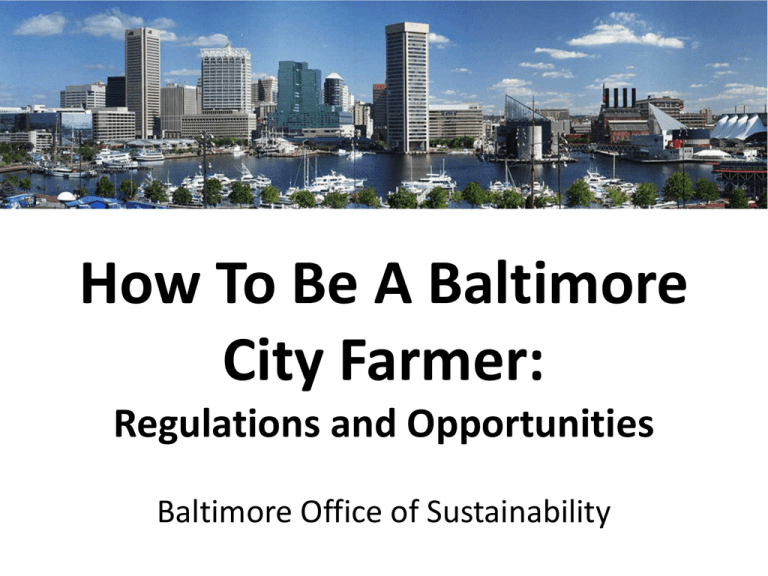
How To Be A Baltimore City Farmer: Regulations and Opportunities Baltimore Office of Sustainability Zoning and Permitting Transform is coming! • The Baltimore City Zoning Code is being rewritten, as a whole, for the first time since the 1970s. • The new Zoning Code is called “Transform Baltimore”, and the draft text and maps can be found at www.rewritebaltimore.org. • Transform has gone through two rounds of public comment and will go to the City Council for approval this year. Suggestions may still be submitted to the Planning Department, but time is growing very short to make changes. What’s Changing? • Currently: Community gardens and urban farms are not technically permitted because there are no use categories for them, but have been allowed as “temporary uses”… even though some have been in existence for 20+ years! • Undeer Transform: Community gardens (aka Community-Managed Open Spaces) will be a permitted use in most districts and urban farms (aka Urban Agriculture) will be a conditional use in most districts. The two new uses will be defined and subject to basic standards Definitions • Community-Managed Open Space. An open space area maintained by more than one (1) household that is used for the cultivation of fruits, flowers, vegetables or ornamental plants, or as a community gathering space for passive or active recreation, excluding playgrounds. • Urban Agriculture. The cultivation, processing, and marketing of food within the City, which may or may not include the use of intensive production methods, structures for extended growing seasons, and on-site sale of produce. It may also involve animal husbandry, aquaculture, agro-forestry, vineyards and wineries, and horticulture. “Urban Agriculture” is characterized by a primary emphasis on income-generating agricultural activity and the operation of the farm as a business enterprise. Where will they be allowed? Community-Managed Open Spaces will be a permitted use in all zoning districts and Urban Agriculture will be a conditional use in all zoning districts with the exception of industrial zones, which are as follows: OIC BSC I-MU CMOS P P P UA P P P OIC = Office-Industrial Campus I-MU = Industrial Mixed-Use I-2 = General Industrial I-1 I-2 MI P BSC = Bio-Science Campus I-1 = Light Industrial MI = Maritime Industrial Permitted Use • A use permit is required before any person may use, for any purpose, previously-vacant land, or make any changes in the authorized use of any land or structure. • As long as use standards are met, permitted uses are allowed by default. An inspector will review your application and possibly visit your site to ensure compliance. • There is a one-time permit fee that is usually $35. • You must own the site or have permission from the owner to get a use permit, so self-help nuisance abatement sites will continue to be considered “temporary uses”. Conditional Use • A use is classified as conditional when the impact on the public needs to be considered case by case. • The Board of Municipal and Zoning Appeals conducts a public hearing within 75 days of receiving a conditional use application. A notice of the hearing must be posted on the property in question by the applicant. • Conditional use requests must be approved unless the use is found to be contrary to the public interest, detrimental to public welfare, precluded by another law or Urban Renewal Plan, or not in harmony with the intent of the Code. • Considerations include impacts on traffic, future development, surrounding uses, accessibility, and preservation. • There is a one-time permit fee that is between $200 and $400. • Conditions may be placed on a conditional use permit. Use Standards: CMOS (1) Limited to the cultivation of herbs, fruits, flowers, or vegetables, and may also include community gathering spaces for active or passive recreation, not including playgrounds. (2) Keeping of livestock permitted as per Health Department regulations. (3) For any cultivation of plants for human consumption, the applicant must use imported, clean soil OR soil testing is required and proposed remediation methodology, if needed, must be presented. (4) Permanent structures are prohibited, but temporary greenhouses, sheds, gazebos, and pergolas, are permitted. (5) One farmstand per zoning lot is permitted and is limited to sales of items grown at the site, must be stored when the site is not open for public use. Use Standards: Urban Ag (1) Urban ag uses that involving the following must submit a management plan for approval: – Animal husbandry – Processing of food produced on site. – Spreading of manure, sludge, or other nutrient-rich fertilizers. – Spraying of agricultural chemicals, including fertilizers, fungicides and pesticides. – Use of heavy equipment such as tractors. (2) Greenhouses are permitted, either permanent or temporary. (3) For any cultivation of plants for human consumption, the applicant must use imported, clean soil OR soil testing is required and proposed remediation methodology, if needed, must be presented. Use Standards: Urban Ag (cont.) (4) Permanent accessory structures limited to tool sheds, shade pavilions, barns, rest-room facilities, planting prep houses, and post-harvest processing facilities. Buildings must be set back 10 feet from lot lines and must be under 25 feet in height, except for structures designed to capture wind energy which may be taller. (5) Combined area of all accessory structures limited to 25% of total lot area. (6) Farmstands permitted, must be stored when the site is not open for public use. Animal Husbandry Recently Updated! • The Baltimore City Health Department’s Health Code regulates what animals may be kept in the city and the conditions required for their care. • The “Regulations for Wild, Exotic, and Hybrid Animals” were updated in March 2012, and include standards for animals kept as livestock. • The full text of the new regulations can be read here (and will soon be up on the city’s website): http://www.scribd.com/doc/87982503/NEWACexoti cregs For more info, call Animal Control at 410-3964688. Bees • Must be registered with the Maryland Department of Agriculture, proof of which must be kept on hand for inspections. • No more than 2 hives on lots smaller than 2,500 square feet. One additional hive may be kept for every 2,500 sf after that. • Must be inaccessible to the general public, at least 5 feet from any lot line, and kept in such a way that they do not unreasonably interfere with surrounding uses and public right of ways. • Must have easy access to water. Chickens • Must be registered with the MDA’s Agriculture, Domestic Poultry, and Exotic Bird Registration Division. • No more than 4 chickens on lots smaller than 2,000 square feet. One additional chicken may be kept for every 1,000 sf after that up to a maximum total of 10. • No roosters. • Must be provided with an enclosure or pen which must be clean, moved regularly, and allow adequate space (2 sf per hen), shelter, and shade, and which must be at least 15 feet from any residence. • Must be provided with fresh food and water and cared for if sick or injured. Rabbits • No more than 4 rabbits on lots smaller than 2,000 square feet. One additional rabbit may be kept for every 1,000 sf after that up to a maximum total of 10. • Must be provided with an enclosure or pen which must be clean, moved regularly, and allow adequate space (2 sf per rabbit), shelter, and shade, and which must be at least 15 feet from any residence. • Must be provided with fresh food and water and cared for if sick or injured. Goats • Must be miniature, dwarf, or pygmy breeds. • No more than 2 goats plus any offspring under 6 months of age on lots smaller than 20,000 square feet. One additional goat may be kept for every 5,000 sf after that up to a maximum total of 6. • Must be dehorned and, for male goats over the age of 6 months, neutered. • Must be provided with at least 150 square feet of permeable space each in a yard that is fenced, properly graded, drained, and kept clean. • Must be provided with fresh food and water. Special Rules • Must have a conference with Animal Control to review process and sign forms. • Applicant and any employees can’t have been convicted of animal abuse, cruelty, or neglect. • Must provide a photo and proof of any relevant vaccinations and health examinations. • Must have permission from property owner. • Must post a notice on property 10 days prior to granting of permit. If written objections are received a public hearing will be held. • There is a one-time fee that is usually $80. What about fish? • Many other livestock animals, such as sheep, cows, pigs, emus, etc. are specifically prohibited by the Health Code, but FISH are not mentioned! Aquaculture is not currently regulated by the City of Baltimore and there are no plans at the present time to begin regulating it. • The Maryland Department of Natural Resources DOES regulate aquaculture for potential impacts on surrounding water bodies. • For more info, contact Karl Roscher at 410-2608320 or kroscher@dnr.state.md.us. Land For Farming Homegrown Baltimore: Grow Local, Buy Local, Eat Local A Partnership of… & In order to accomplish… Strategy 6: Maintain, Clear and "Land Bank" for Interim and Future Use In areas where the scale of blight far exceeds development demand for housing for the foreseeable future, Baltimore Housing will focus on maintaining, clearing and holding-or "land banking"-vacant property for future use. The strategy includes targeted demolition, boarding and cleaning, and creative interim uses including creating new community green space where demand for housing doesn't yet exist. And… Baltimore Sustainability Plan Greening Goal #2: Establish Baltimore as a leader in sustainable, local food systems • Strategy A: Increase the percentage of land under cultivation for agricultural purposes • Strategy B: Improve the quantity and quality of food available at food outlets • Strategy C: Increase demand for locallyproduced, healthy foods by schools, institutions, super-markets and citizens • Strategy D: Develop an urban agriculture plan • Strategy E: Implement Baltimore Food Policy Task Force recommendations related to sustainability and food • Strategy F: Compile local and regional data on various components of the food system By turning vacant city-owned land… …into new urban farms! Also in the context of the… Baltimore Food Policy Initiative Goal: To increase access to healthy and affordable foods in Baltimore City food deserts. • 2009 – Food Policy Task Force Convened • 2010 – First Food Policy Director Hired (Holly Freishtat) • 2010 – Food Policy Action Committee Created • 2011 – Food Access Coordinator Hired (Jamie Nash) http://www.baltimorecity.gov/Government/ AgenciesDepartments/Planning/ BaltimoreFoodPolicyInitiative.aspx Summer 2010: Land Assessment Looking for contiguous parcels equaling at least one acre in size, cityowned, no short to mid term development plans, near food deserts, flat, open to the sun, and matching other agronomic characteristics. Identified approximately 35 acres. Spring 2011: Request for Qualifications • Timeline: – – – – RFQ Issuance: March 25, 2011 Applications Due: May 6, 2011 Applicant Interviews: June 17, 2011 Notifications: July 25, 2011 • Minimum qualifications: – – – – At least 1 year of experience Sustainable management plan Openness to community involvement Financially sound proposal Terms & Finances • 5-year leases (with 2-year notice to vacate), terms based on farm type • Rate of $100/year • No taxes on non-profit farms • For-profit farms may be eligible for tax breaks • Funding will be available to help with initial capital costs Results & Next Steps • Received 10 responses • 5 respondents were selected for qualification – 3 forprofits, 1 non-profit and 1 benefits corporation • Aiming to begin farming operations this spring • RFQ is available at www.baltimoresustainability. org but is currently closed • Plan to re-issue as early as spring 2013 How to Stay in the Loop Contact: 410-396-1670 or abby.cocke@baltimorecity.gov Website: www.baltimoresustainability.org Commission on Sustainability Meetings: 4th Tues of every mont, 4-6pm, 417 E. Fayette St., 8th floor Facebook: www.facebook.com/baltimoresustainability Twitter: @SustainBmore Newsletter: Sign up on our website or email us at sustainability@baltimorecity.gov
